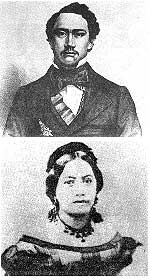Readings:
Micah 4:1-4
Psalm 33:12–22
Acts 17:22-31
Matthew 25:14-29Preface of Baptism
[Common of a Saint]
[For All Baptized Christians]
[For Vocation in Daily Work]
PRAYER (traditional language)
O God, who didst call thy servants Kamehameha and Emma to an earthly throne that they might advance thy heavenly kingdom, and gave them zeal for thy church and love for thy people: Mercifully grant that we also may be
fruitful in good works and attain to the glorious crown of thy saints; through Jesus Christ our Lord, who liveth and reigneth with thee and the Holy Ghost, one God, for ever
and ever. Amen.
PRAYER (contemporary language)
O God, who called your servants Kamehameha and Emma to an earthly throne that they might advance your heavenly kingdom, and gave them zeal for your church and love for your people: Mercifully grant that we also
may be fruitful in good works, and attain to the glorious crown of your saints; through Jesus Christ our Lord, who lives and reigns with you and the Holy Spirit, one God, for
ever and ever. Amen.
Return to Lectionary Home Page
Webmaster: Charles Wohlers
Lessons revised at General Convention 2024
Last updated: 28 Sept. 2024
KING KAMEHAMEHA AND QUEEN EMMA OF HAWAII
(28 NOV 1864)
 King
Kamehameha IV and his wife Emma were Christian rulers who encouraged the
building of Christian schools and hospitals, and who contributed greatly
to the spread of Christianity among the Hawaiian people. The King was
worried by the growth of American political influence, directly connected
with the work of American missionaries, many of whom openly favored annexation
of the islands by the United States. He accordingly invited the Church
of England to send missionaries and to establish a presence in Hawaii.
(While touring England as a prince, he had attended worship services,
and had been favorably impressed.) But, although the King's support of
the Church of England was perhaps politically motivated, his support of
Christianity was not. He and his wife were earnest in their devotion to
both the material and the spiritual welfare of their people. The
King personally translated the Book of Common Prayer and much of the Hymnal
into Hawaiian. Their only son died in 1863, and the King died, apparently
of grief, on 30 November 1864. The Queen devoted the remainder of her
life to charitable endeavors (Queen's Hospital, the largest civilian hospital
in Hawaii, is largely her doing). She died in 1885.
King
Kamehameha IV and his wife Emma were Christian rulers who encouraged the
building of Christian schools and hospitals, and who contributed greatly
to the spread of Christianity among the Hawaiian people. The King was
worried by the growth of American political influence, directly connected
with the work of American missionaries, many of whom openly favored annexation
of the islands by the United States. He accordingly invited the Church
of England to send missionaries and to establish a presence in Hawaii.
(While touring England as a prince, he had attended worship services,
and had been favorably impressed.) But, although the King's support of
the Church of England was perhaps politically motivated, his support of
Christianity was not. He and his wife were earnest in their devotion to
both the material and the spiritual welfare of their people. The
King personally translated the Book of Common Prayer and much of the Hymnal
into Hawaiian. Their only son died in 1863, and the King died, apparently
of grief, on 30 November 1864. The Queen devoted the remainder of her
life to charitable endeavors (Queen's Hospital, the largest civilian hospital
in Hawaii, is largely her doing). She died in 1885.
(Fans of the television program, MAGNUM, P I, will be disappointed to learn that the King Kamehameha Club was probably named for King Kamehameha I, who was a somewhat different sort of ruler.)
HISTORICAL NOTE: Their successor, Kamehameha V, suspended the constitution
and announced his intention to rule in the traditional autocratic manner.
By the end of his life, he was too fat to walk unaided. He was the last
of his dynasty. In 1893 Queen Liliuokalani was deposed and a republic proclaimed.
In 1894, the republic acquired its first president, Sanford B. Dole. (His
family is in the pineapple business.) In 1898, the United States, (having
just acquired Cuba, Puerto Rico, Guam, and the Philippines in a brief war
with Spain, and being in an expansionist mood) annexed the Republic of
Hawaii at the request of the government thereof.
US troops withdrew from Cuba (except for Guantanamo
Naval Base) in 1902.
The Philippines became independent in 1946.
Puerto Rico, by vote of its inhabitants, has rejected
both independence and becoming one of the United States, and has been since
1952 officially an "associated commonwealth," whose citizens are also citizens
of the United States, free to travel between the two countries, voting
in US elections when on the mainland, free of US taxes when on the island.
Guam has been a self-governing unincorporated US
territory since 1950. Since the 1970's, there has been talk of giving it
the same status as Puerto Rico.
Hawaii was made a territory in 1900 and a State
in 1959.
by James Kiefer
[We have online King Kamehameha's 1862 translation of the Book of Common Prayer.